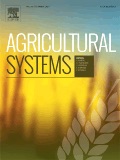A review of Agent Based Modeling for agricultural policy evaluation
Abstract
Farm level scale policy analysis is receiving increased attention due to a changing agricultural policy orientation. Agent based models (ABM) are farm level models that have appeared in the end of 1990’s, having several differences from traditional farm level models, like the consideration of interactions between farms, the way markets are simulated, the inclusion of agents’ bounded rationality, behavioral heterogeneity, etc. Considering the potential of ABMs to complement existing farm level models and that they are a relatively recent approach with a growing demand for new models and modelers, we perform a systematic literature review to (a) consolidate in a consistent and transparent way the literature status on policy evaluation ABMs; (b) examine the status of the literature regarding model transparency; the modeling of the agents’ decision processes; and the creation of the initial population.
Download full text in pdf format
 Published as:
Published as:
D. Kremmydas,
I. N. Athanasiadis,
S. Rozakis,
A review of Agent Based Modeling for agricultural policy evaluation,
Agricultural Systems, 164:95-106,
2018, doi:10.1016/j.agsy.2018.03.010.
You might also enjoy (View all publications)
- CY-Bench: A comprehensive benchmark dataset for sub-national crop yield forecasting
- Hybrid phenology modeling for predicting temperature effects on tree dormancy
- To measure or not: A cost-sensitive, selective measuring environment for agricultural management decisions with reinforcement learning
